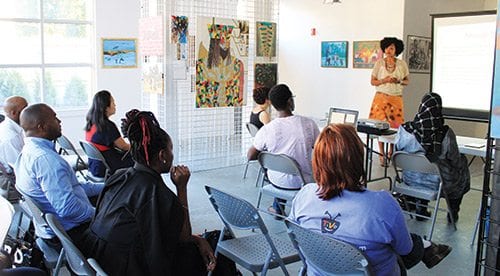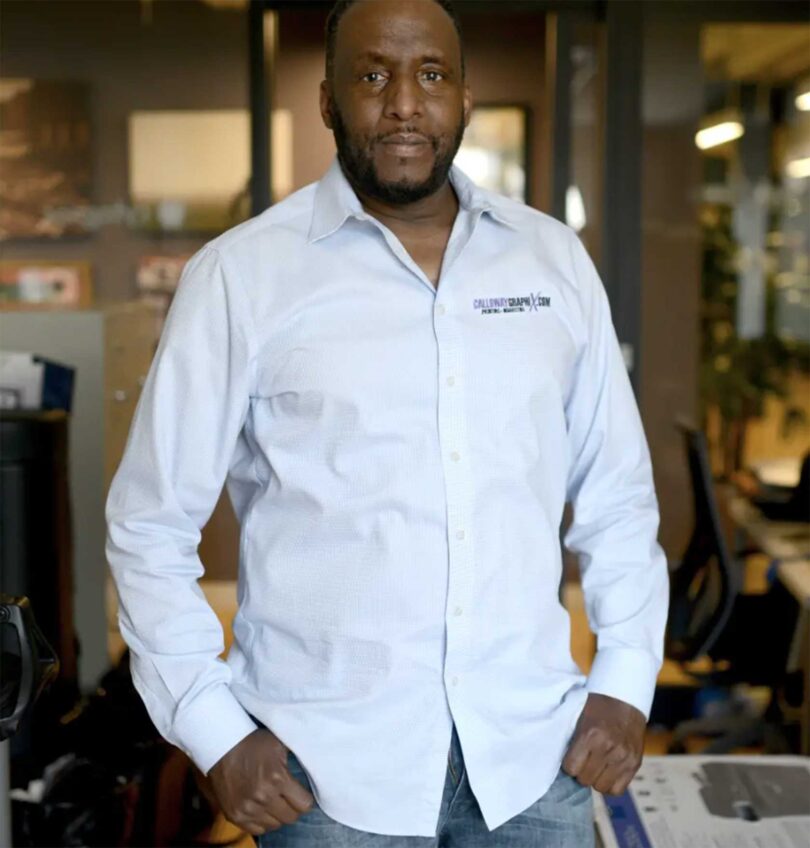
Women-owned businesses are on the rise — most accounts find they make up about 30 percent of all privately held firms in the U.S. — but there is concern that many of these business top out early. Helping women entrepreneurs grow their businesses to the next level has become a big emphasis and, in the Boston region, there are a number of organizations that are working on innovative solutions to move women-owned businesses to the next level.
According to data collected by the National Association of Women Business Owners, in 2014 more than 9.1 million firms in the U.S. were majority owned by women, employing nearly 7.9 million people and generating $1.4 trillion in sales. But those figures account for just 14 percent of the employment and a meager 11 percent of the revenue.
Women have no problem starting companies, the trouble is growing them. Just 4.2 percent of all women-owned firms have revenues of more than $1 million. Ernst & Young has studied this issue in recent years and concludes that companies owned by men are almost four times as likely to hit the million-dollar mark compared to those owned by women. In 2008, the accounting giant launched its Entrepreneurial Winning Women program to address the problem and provide mentorship and coaching to women entrepreneurs.

Author: Photo courtesy the Greater Boston Chamber of CommerceWomen in Workplace Panel held during a May GBCC Women’s Network breakfast, left to right: Victoria Budson, Executive Director, Women and Public Policy Program, Harvard KSG; Megan Costello, Executive Director, Office of Women’s Advancement, City of Boston; Cathy Minehan, Dean, Simmons School of Management; Evelyn Murphy, President, The WAGE Project, Inc.; Beth Williams, President & CEO, Roxbury Technology, LLC
Locally, organizations have been supporting women-owned businesses for decades, with the goal of increasing the area network of women entrepreneurs and business owners. The lack of strong business networks is often cited as one reason that women-owned businesses falter beyond the initial stages. A 2013 AMEX Open Report suggests that networks of women entrepreneurs and business owners are generally smaller and less diverse than those of their male counterparts, and women tend to draw more on their personal relationships, particularly family, than on other sources — conditions that are associated with lower innovation and lower growth expectations.
The Greater Boston Chamber of Commerce has been working to expand Boston’s businesswomen network in the 20 years since it first created its Women’s Network. The most consistent Women’s Network programming over the years has been its networking breakfasts, which bring together women of all career levels and offer speakers, roundtables and panels.
Katy O’Neil, Greater Boston Chamber of Commerce executive vice president, said the breakfasts allow women to share different voices and perspectives and begin to build a more diverse network that can stimulate professional growth.
“We are providing cross-sector relationship building,” she said. “You are really exposing these women to all industries across Greater Boston.”
The network breakfasts are held every month, except in July and August and in January when the chamber holds its other big women’s event, The Pinnacle Awards. The awards event honors women who have demonstrated excellence in entrepreneurship, management and lifetime achievement and typically draws 1,000 attendees.
In February, the breakfast featured a “Leading Female Entrepreneurs” panel with Suzanne Bates, CEO of Bates Communications; Andrea Cohen, co-founder of HouseWorks; Diane Hessan, CEO of the Startup Institute; and Sandy Lish, principal and founder of the Castle Group. A May panel, “Women in the Workplace: Issues that Impact Us All,” featured Harvard Kennedy School Executive Director Victoria Budson and Boston’s Office of Women’s Advancement Executive Director Megan Costello. Individual speakers at breakfasts this year included Joanne Chang, owner of Flour Bakery & Café; and Gail McGovern, president and CEO of the American Red Cross.
Five years ago the chamber started the Women’s Leadership Program, designed to help female professionals with less than 10 years of experience enhance leadership skills and develop professional networks. The year-long program features a seminar at Simmons School of Management, workshops and roundtables. Originally the program had 50 participants per year, but the demand for the program is so high that last year the chamber expanded it to include two simultaneous programs, both with 50 women each.
A clear success
O’Neil emphasized that the Women’s Network is one of the clear Chamber successes, with 65 women on the network advisory board and 2,500 businesswomen signed up to be notified about programs and events.
“It is a very strong part of the Chamber’s work. Our Women’s Network might be one of the largest, most well-known opportunities in Boston to connect,” she said.
The Massachusetts District Office of the U.S. Small Business Administration, through its small business loan programs typically makes about 300-400 loans a year, for more than $60 million, to women-owned businesses in the state. In 2014, SBA loan programs in the state provided $595 million in total to small businesses. But it also supports women-owned businesses in other ways.
Nationally, the SBA launched a Women-Owned Small Businesses Program in 2011 to help these businesses expand their revenue through government contracts. The SBA also has a network of about 100 Women’s Business Centers around the country, which are designed to assist women in starting and growing small businesses.
Funding from an SBA grant led to the 1995 founding of the Center for Women in Enterprise, which has offices in Boston, Worcester, Providence, R.I., and Nashua, N.H. The Center provides opportunities for women entrepreneurs and women in business to increase professional success, personal growth and financial independence through education programs, training, technical assistance and women’s business enterprise certification. Since 1995, the Center has trained more than 33,000 entrepreneurs and helped them generate more than $1 billion in wages. The Center typically works with more than 5,000 entrepreneurs a year through its various services.
While the CWE has programs that run the gamut from business plan basics to legal structures to marketing, recently launched finance panels have been a big hit and provide women entrepreneurs more insight into ways to grow their experience.

Author: Photo courtesy of Center for Women in EnterpriseYooree Losordo (right), owner of On the Dot Books in Dorchester, speaks to Liora Beer, the Executive Director of Art Morpheus.
CWE has held three finance panels so far in 2015, bringing in experienced businesswomen, including Jacqueline De La Rosa of Mark Cuban Companies; Sarah Murphy of Common Angels; Susan Keller, managing director of LGC+D; and Jeanine Hall, vice president of Bank of America, to host informal discussions with local entrepreneurs.
According to Gina Marciano, program manager in the Boston office of the Center for Women in Enterprise, the open forum format of the panels covers topics from equity financing to microfinance to working with angel investors to crowdfunding.
“It is very well received. It is a chance for people to really get all their questions out,” Marciano said. “We hope people leave there with a more comprehensive and more realistic understanding of ways to finance their business and how those different ways can fit together.”
All of CWE’s efforts are aimed to create a strong network that women entrepreneurs can lean on, no matter what stage their businesses are in.
Critical mentoring
Another organization that works with women, and also draws on an affiliation with the SBA, is SCORE. A national organization that offers free counseling, low-cost workshops and free business reviews, it has a Boston chapter that does more than 4,000 sessions a year. SCORE is designed to help business owners increase the value of a business, solve operating problems, recognize and capitalize on new business opportunities, develop business plans and find sources of funding.
The organization is not specifically target toward women, but has an estimated 30-40 percent women clientele.
SCORE’s strength is the critical mentoring it can provide by matching up young entrepreneurs with veteran businessmen and businesswomen. There are 55 counselors — a number of whom are women — who volunteer in the Boston chapter.
Counselor Elizabeth Brown, a veteran executive with 30 years in the software industry, says that women entrepreneurs who come to SCORE value her experience and she is glad to share what she has learned in her decades-long professional career, particularly anything that relates to being a women in the corporate world.
While sound business advice is sound business advice no matter who gives it, Brown stressed there is a value in a woman’s perspective.
Her goal is to help women entrepreneurs grow their businesses and build a stronger network to fuel this growth. If a client asks for accounting help, for example, Brown brings in a colleague of hers to help with this. The same holds true for other areas of need a small business owner may have.
“They basically get a board of advisors and we all work together,” Brown said. “We give them guidance, they go out and do their homework and they come back for more feedback.”
Brown also has a vision of a more equitable corporate environment and backs SCORES’ efforts to expand its partnerships with more organizations that specifically work with businesswomen in order to continue to bridge the gender gaps that have long existed.
“My goal is to see men and women do a lot of business together,” she said. “I feel very strongly it is better to have more people involved from different perspectives.”






